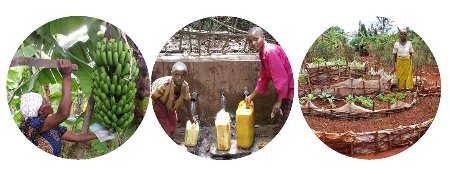Making an impact particularly in the poorest communities
New and improved agricultural techniques are essential in order to avoid famine and hunger

Activities
- New methods of agriculture
- Re-establishment of sustainable livelihoods
- Productivity of family plots
- Diversification of crops
- Food security
- Animal husbandry
- Management of water
- Associations and small businesses
- Training and capacity building
Agriculture has always been and remains foundational to food security and economic growth in Burundi. Performance in the agricultural sector has been affected by the socio-political crisis, climate change, lack of improved inputs and the poverty level of communities. Most of the population relies on subsistence farming and it has therefore been imperative to develop new and improved agricultural techniques in order to avoid famine and hunger.
The Church has been involved in various projects to increase food production by improving and diversifying crops and introducing new high yield varieties such as maize, sun flower, bananas, beans, and cassava within communities. The development of family kitchen gardens is helping to increase and diversify the production of vegetables with the result that the nutrition of young children, people living with HIV, pregnant women and those still breast-feeding is improved.
A rapidly increasing population in Burundi is resulting in a growing demand for land. The mountainous, steeply sloping terrain in much of the country is subject to wind and rainwater erosion. As land becomes scarcer and less fertile significant socio-economic and environmental threats increase.
Across the dioceses an integrated approach has been developed to stabilise the soil, to restore and increase its fertility and to manage water. Communities have been establishing trenches for excess water along which a double row of grass is planted to provide fodder for animals. Bananas are planted in the trenches. In addition, by promoting and improving composting systems food production has increased.
The Province of the Anglican Church of Burundi is seeking to make an impact particularly in the poorest communities by providing training, tools, materials and improved seeds. Farmers are actively involved in activities that protect their land and reduce the vulnerability of their families and communities.
